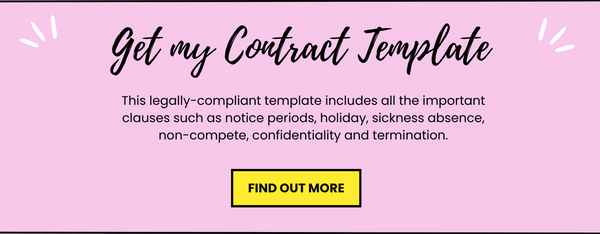Is it okay to ask my staff to work on the occasional weekend?

The answer’s yes, you can absolutely ask! But as always, I’d advise you to handle it the responsible way. 😀
Sometimes, because of the nature of your business, you may need your staff to work a weekend – even when this isn’t normally the case.
Perhaps you’ve got a massive order to fulfil? Or maybe you’re coming up to a mega busy time of year? Whatever the reason, it’s pretty normal for businesses to flex things a bit to deal with spikes in customer demand.
But in my experience, you’ve gotta do it the right way. Here’s how…
LET’S BEGIN WITH SOME DEFINITIONS
Overtime is basically the additional time a person works, over and above the normal hours in their contract.
There are three types of overtime:
- Voluntary
- Compulsory and guaranteed, and
- Compulsory but non-guaranteed
Voluntary overtime – which is essentially what you’re referring to – means there’s no obligation for you to offer it, and no obligation for your employees to do it. And what’s more, you can’t chastise them for saying no!
CHECK OUT THE CONTRACT
You probably already know what’s in your staff contracts. But it’s worth checking out the specifics. After all, this won’t be a document that gets looked at regularly.
Reading it again is particularly helpful if you’re anticipating any tricky conversations. And of course, the contract is king, so you need to stick to it.
What the contract says about hours ⏰
Your employee’s contract should say what the “normal” working hours are.
But have you made it clear that overtime might be required at the weekend? If so, you have every right to ask your employees to work.
It’s likely you haven’t though – if you’re reading this blog. Don’t worry, you can still ask, but your staff don’t have to say yes. Employees only have to work overtime if their contracts say so.
It’s also worth remembering that in general, you can’t ask them to work – on average – more than 48 hours per week, because of Working Time Regulations.
What the contract says about pay 💷
Again, overtime pay rates are usually spelt out in your employee’s contract. If not, don’t stress, you don’t have to pay your employees a higher rate for overtime. In fact, employers do not have to pay workers for overtime. But make sure the hourly rate you pay, doesn’t fall below the national minimum wage.
If the contract does say that overtime will be paid at a higher rate – then you must pay it! Or else, you leave yourself wide open to a breach of contract, where your employee could claim for an “unlawful deduction of wages.” And let’s face it, you don’t want that!
NOTHING IN THE CONTRACTS ABOUT OVERTIME?
I’ll say it again, employees don’t have to agree to working overtime when it’s not in their contract. But that shouldn’t put you off asking. Just be totally fair and reasonable about it.
Put yourself in the shoes of your employees. 👠 Some of them might jump for joy at the possibility of earning more cash. Whereas others might be stressed out by having to juggle work and family commitments.
Try not to worry. Loads of businesses never think they’ll be in a position where they’re having to ask their employees to work a few extra hours at the weekend. It’s actually a nice problem to have.
SMART WAYS TO APPROACH IT WITH YOUR STAFF
If you’re asking your employees to work overtime on the odd weekend – when it’s not in their contract – you should:
- Be super fair and offer it to everybody who’s able to do the job.
- Be honest about why you need their help.
- Don’t put anyone under pressure.
- Reassure your people that these are totally exceptional circumstances and not the norm (if they truly are).
- Have your pay and hours strategy worked out before you speak to your team. If you can afford to – and you think it will make a difference – offer a higher rate of pay, as loads of companies do (like time and a half for example).
- And finally, don’t react negatively to people who say no.
THINK ABOUT OTHER OPTIONS
Instead of paying for overtime, TOIL might be a more attractive alternative.
It stands for ‘Time Off in Lieu’ and essentially means your employees can work the occasional weekend, but you’ve gotta give them the same number of hours off work – at a future time to be arranged – with no extra pay.
Of course, if your employee’s contract says that overtime must always be paid, then TOIL isn’t an option. Sorry ☹️.
LAW CHANGE FROM 6 APRIL 2020
When you hire someone new (either an employee or a worker) – as a minimum – you’ve gotta make sure they have a ‘written statement of employment particulars’ before they start, or on their first day.
On 6 April 2020, the law changed around who should get this statement, when they should get it, and what needs to be in it. The bottom line is that you have to say upfront if you want your people to work overtime.
A ‘written statement of employment particulars’ is not an employment contract and might not offer you the peace of mind and protection – that comes from my top-notch, fantastically-written employment contract template.
THINK AHEAD
If weekend working is likely to become a more regular thing in the future, it’s worth reviewing your resourcing strategy now. That could mean changing contracts for existing staff and new recruits.
Obviously, you’ve gotta do this the proper way – to minimise any unnecessary upset or bother to you and your people. But do think about the long-term strategy for your business – especially now we live in a 24/7/365 world.
Oh, and shop staff (including betting shops) have Sunday working rights. So, look into that before you make any permanent changes.







